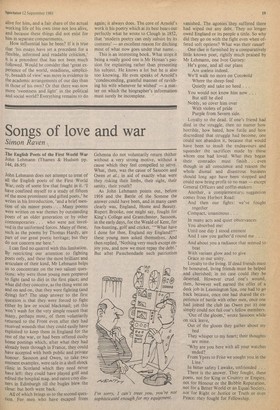Songs of love and war
Simon Raven \
The English Poets of the First World War John Lehmann (Thames & Hudson pp. 144, £6.95)
John Lehmann does not attempt to treat of all the English poets of the First World War, only of some few that fought in it. 'I have confined myself to a study of fifteen of the most prominent and gifted poets,' he writes in his Introduction, 'and a brief mention of six minor poets. . . Many poems were written on war themes by outstanding Poets of an older generation or by other Contemporaries. . . who were not involved in the uniformed forces. Many of these, such as the poems by Thomas Hardy, are Part of our great poetic heritage; but they do not concern me here.'
I can find no quarrel with this limitation. By restricting our attention to fighting Poets only, and these the most brilliant and articulate of their kind, Mr Lehmann helps us to concentrate on the two salient questions: why were these young men prepared to fight (and to die) in the first place; and What did they conceive, as the thing went on and on and on, that they were fighting (and dying) for? The snap answer to the first question is that they were forced to fight either by law or social blackmail; yet this won't wash for the very simple reason that Many, perhaps most, of them voluntarily returned to the Front even after they had received wounds that they could easily have exploited to keep them in England for the rest of the war, or had been offered cushy home postings which, after what they had already been through in France, they could have accepted with both public and private honour. Sassoon and Owen, to take two eminent examples, were safe in a shell shock Clinic in Scotland which they need never have left: they could have played golf and edited the hospital mag. and eaten cosy dinners in Edinburgh till the bugles blew the Close: but both went back.
All of which brings us to the second question. For men who have escaped from Gehenna do not voluntarily return thither without a very strong motive, without a cause which they feel compelled to serve. What, then, was the cause of Sassoon and Owen et al.; in aid of exactly what were they risking their limbs, their sight, their sanity, their youth?
As John Lehmann points out, before 1916 and the Battle of the Somme the answer could have been, and in many cases clearly was, England, Home and Beauty. Rupert Brooke, one might say, fought for King's College and Grantchester, Sassoon, in the early days, for the Weald of Kent, for fox-hunting, golf and cricket. "What have I done for thee, England my England?" these young men asked themselves. And then replied, 'Nothing very much except enjoy you, and now we must repay the debt.' But after Passchendaele such patriotism vanished. The agonies they suffered there had wiped out any debt. They no longer owed England or its people a tittle. So why did they go on with the fight even when offered soft options? What was their cause?
One clue is furnished by a comparatively little known poet, rightly much praised by Mr Lehmann, one Ivor Gurney: He's gone, and all our plans Are useless indeed.
We'll walk no more on Cots*old Where the sheep feed Quietly and take no heed . .
You would not know him now But still he died Nobly, so cover him over With violets of pride Purple from Severn side.
Loyalty to the dead. If one's friend had died in the struggle, then no matter hov, horrible, how hated, how futile and how discredited that struggle had become, one could not abandon it, because that would have been to insult the endeavours and squander the sacrifices made by those whom one had loved. What they began their comrades must finish . . . even though in all conscience and reason the whole dismal and disastrous business should long ago have been stopped and could now bring profit to no man — except General Officers and coffin-makers.
Another, a complementary, suggestion comes from Herbert Read: And then our fights: we've fought together Compact, unanimous . .
In many acts and quiet observances You absorbed me: Until one day I stood eminent And I saw you gather'd round me . . .
And about you a radiance that seemed to beat With variant glow and to give Grace to our unity.
Loyalty to the living. If dead friends must be honoured, living friends must be helped and cherished; in no case could they be deserted. However cruel one's wound, then, however well earned the offer of a desk job in Leamington Spa, one had to go back because, once one had shared the experience of battle with other men, once one had joined the club (as Owen put it) one simply could not fail one's fellow members.
'Out of the gloom,' wrote Sassoon while on sick leave, Out of the gloom they gather about my bed They whisper to my heart; their thoughts are mine.
'Why are you here with all your watches ended?
From Ypres to Frise we sought you in the Line.'
In bitter safety I awake, unfriended .
There is the answer. They fought, these poets, not for King or Country or Empire, not for Honour or the Bubble Reputation, not for a Better World or an Equal Society, not for Right or Justice or Truth or even Peace: they fought for Fellowship.
































 Previous page
Previous page